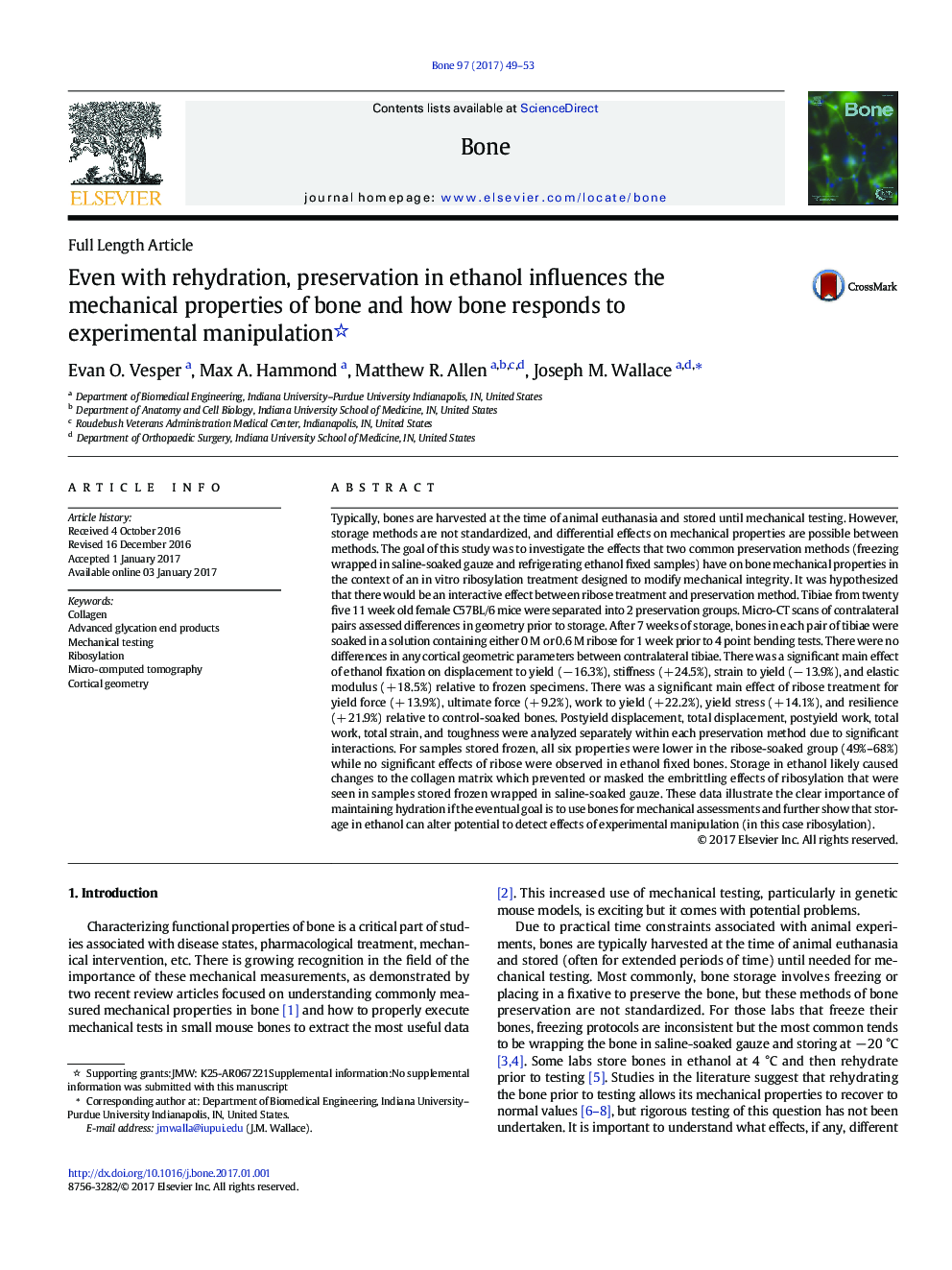| کد مقاله | کد نشریه | سال انتشار | مقاله انگلیسی | نسخه تمام متن |
|---|---|---|---|---|
| 5585407 | 1568122 | 2017 | 5 صفحه PDF | دانلود رایگان |
عنوان انگلیسی مقاله ISI
Even with rehydration, preservation in ethanol influences the mechanical properties of bone and how bone responds to experimental manipulation
ترجمه فارسی عنوان
حتی با احیاء مجدد، حفظ در اتانول بر خواص مکانیکی استخوان اثر می گذارد و نحوه برخورد استخوان به دستکاری تجربی
دانلود مقاله + سفارش ترجمه
دانلود مقاله ISI انگلیسی
رایگان برای ایرانیان
کلمات کلیدی
کلاژن، محصولات پیشرفته گلیساسیون، تست مکانیکی، ریبوزیلت، توموگرافی کامپیوتری میکروسکوپی، هندسه قورباغه،
موضوعات مرتبط
علوم زیستی و بیوفناوری
بیوشیمی، ژنتیک و زیست شناسی مولکولی
زیست شناسی تکاملی
چکیده انگلیسی
Typically, bones are harvested at the time of animal euthanasia and stored until mechanical testing. However, storage methods are not standardized, and differential effects on mechanical properties are possible between methods. The goal of this study was to investigate the effects that two common preservation methods (freezing wrapped in saline-soaked gauze and refrigerating ethanol fixed samples) have on bone mechanical properties in the context of an in vitro ribosylation treatment designed to modify mechanical integrity. It was hypothesized that there would be an interactive effect between ribose treatment and preservation method. Tibiae from twenty five 11 week old female C57BL/6 mice were separated into 2 preservation groups. Micro-CT scans of contralateral pairs assessed differences in geometry prior to storage. After 7 weeks of storage, bones in each pair of tibiae were soaked in a solution containing either 0 M or 0.6 M ribose for 1 week prior to 4 point bending tests. There were no differences in any cortical geometric parameters between contralateral tibiae. There was a significant main effect of ethanol fixation on displacement to yield (â 16.3%), stiffness (+ 24.5%), strain to yield (â 13.9%), and elastic modulus (+ 18.5%) relative to frozen specimens. There was a significant main effect of ribose treatment for yield force (+ 13.9%), ultimate force (+ 9.2%), work to yield (+ 22.2%), yield stress (+ 14.1%), and resilience (+ 21.9%) relative to control-soaked bones. Postyield displacement, total displacement, postyield work, total work, total strain, and toughness were analyzed separately within each preservation method due to significant interactions. For samples stored frozen, all six properties were lower in the ribose-soaked group (49%-68%) while no significant effects of ribose were observed in ethanol fixed bones. Storage in ethanol likely caused changes to the collagen matrix which prevented or masked the embrittling effects of ribosylation that were seen in samples stored frozen wrapped in saline-soaked gauze. These data illustrate the clear importance of maintaining hydration if the eventual goal is to use bones for mechanical assessments and further show that storage in ethanol can alter potential to detect effects of experimental manipulation (in this case ribosylation).
ناشر
Database: Elsevier - ScienceDirect (ساینس دایرکت)
Journal: Bone - Volume 97, April 2017, Pages 49-53
Journal: Bone - Volume 97, April 2017, Pages 49-53
نویسندگان
Evan O. Vesper, Max A. Hammond, Matthew R. Allen, Joseph M. Wallace,
